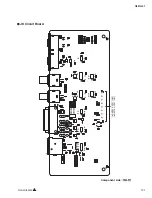
16
where COMMAND can be $NOW, $HRnn, $MAX, $MAXT, $MIN, $MINT or $AVE. N represents the
number of decimal digits which can be from 0 to 9. For example, if a tag's value is 5.123456789, you
can use the following commands to get the following results.
(4) Alarm Printing
ADAMView 4.25
resolves compatibility problems between the alarm printing function and Windows 95/98.
If you will be using this feature in
ADAMView 4.25
, we strongly suggest that you use a dedicated
dot
matrix printer for alarm printing.
According to the Microsoft Knowledge Base, Windows 95/98 does not support single line printing.
Note:
(a) Alarm printing does not work if the printer is shared
(b) Alarm printing is only compatible with dot matrix printers or other printers capable of printing a
single line or a single line feed. It will not work with HP LaserJet printers that must print a complete
page per printing session.
(5) Historical Trend
(a) Support up to 6 Historical Trends. Each Historical Trend can accept up to 8 traces.
(b)
ADAMView 4.25
removes the files generated by Historical Trend Display automatically. It removes
historical log entries that are 30 days old by default. Users can change it to the desired number of
days by setting "HistDaysAgo" under the [System] section in the \Windows\
ADAMView
.INI file as
follows:
[System]
HistDaysAgo = 15
This example will cause
ADAMView
to remove historical file that are older than 15 days old.
Note:
If you want to keep all historical files, you should set "HistDaysAgo = 0".
ADAMView
will not
remove any historical files.
(6) Networking Support
(a) One station can connect to a maximum of fourteen stations, the maximum number of output
stations is seven and the maximum number of input stations is seven. There is no limitation on the
total number of stations in a network.
(b) One station can setup network input and network output blocks simultaneously. The maximum
number of network blocks is 100; this allows a maximum of 800 points in the network.
Command in format file
Result
$NOW(@TASK1#AI1) ms
5.12 ms (by default)
$NOW(@TASK1#AI1).0 ms
5 ms
$NOW(@TASK1#AI1).1 ms
5.1 ms
$NOW(@TASK1#AI1).9 ms
5.123456789 ms











































